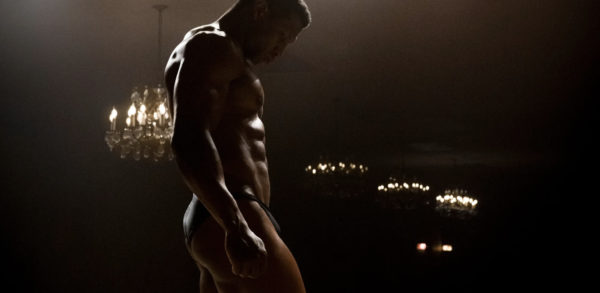
An amateur bodybuilder spirals out of control in writer/director Elijah Bynum‘s latest drama, which just premiered at Sundance.
There’s one major <ahem> talking point when it comes to Magazine Dreams and that’s Jonathan Majors‘ lead performance as Killian Maddox. Expect plenty of reports about the actor’s calorie consumption and exercise regime, which makes sense given how ripped the actor got for the role, and how much of his formidable physique is on display.
It doesn’t hurt that Majors is such a dominating force in the film. Killian isn’t just the main character: he is the film, appearing onscreen in every frame for what is essentially a one man show. When the film succeeds, it is in no small part due to his towering performance as a man teetering on the precipice of disaster.
Magazine Dreams isn’t an easy watch. It caters to the grim and the catastrophic, expertly capturing the feelings of inevitability that accompany struggles with physical and mental decline. The movie marches towards disaster in such an interminable fashion that it’s hard not to be overwhelmed, especially since it is so singularly focalized through Killian’s perspective of a bleak, unfeeling world. The guy is totally fucked up, and there’s no escaping from his downward spiral.
Comparisons to Taxi Driver and other nihilistic masculine texts are inevitable, but Bynum never fully transcends the trappings of personal trauma porn. As a result, Magazine Dreams feels like a series of terrible incidents strung together – minus weight or consequence for Killian’s increasingly erratic and irrational decisions. This is especially apparent in the back half of the film when the character’s bad behaviour escalates to the point of calamity.
Magazine Dreams opens with the amateur bodybuilder pursuing his dream of becoming a national champion and getting on the cover of magazines. In reality, Killian’s life is pretty mundane: he works in a grocery store and has a crush on check-out girl Jesse (Haley Bennett); he lives with his grandfather (Harrison Page); and he works out diligently, augmenting his regiment with steroid injections and cocaine. Killian’s room is plastered with images of bodybuilders, including his hero Brad Vanderhorn (Michael O’Hearn), to whom he writes frequently, signing his letters “your number one fan.”
Bynum isn’t shy about confirming that Killian is, at best, socially awkward, and, at worst, deluded. In addition to his juvenile letters to Brad, he spends hours making YouTube videos that invite cruel internet commentary and berates a local company for their lacklustre job painting his grandfather’s house. When he finally works up the courage to ask Jesse out on a date, the ensuing conversation is predictably uncomfortable.
The film’s penchant for cringe quickly shifts into violence, which escalates as the film continues. Killian’s challenges relating to people, his declining health due to steroid use, and the aftermath of several other setbacks provide all plenty of fodder for Majors to sell Killian’s deteriorating physical and mental health.
Magazine Dreams‘ stand-out sequence is the perfect synthesis of both. After vandalizing the paint store, Killian is beaten by a group of men led by the store owner’s son, Ken Donaghue (Bradley Stryker), immediately before Killian is due to compete in a milestone bodybuilding competition.
Bynum films the attack from the backseat of Killian’s car so the majority of the violence occurs out of sight. Filmed in a long take with slight pans, Killian is dragged from the driver’s seat and brutally kicked and beaten with a pipe. Undeterred, he climbs into his car and drives to the competition venue, walking onstage and attempting to perform, despite the fact that he is bleeding and clearly injured.
It’s a stand-out sequence that encapsulates the film’s themes of determination and drive despite (or in spite of) personal risk. It’s compelling stuff thanks to Majors go-for-broke performance, even when the film shifts the narrative into fantasy as Killian’s erratic and dangerous behaviour becomes increasingly violent without the appropriate ramifications or societal interventions.
At one point Killian is arrested for an incident in a diner and made to answer for his recent actions by his therapist (Harriet Sansom Harris). She poses a number of questions about how he will address the fall-out, and he has no answer…which is a testament to his delusion, but also the film’s seeming disinterest in exploring them.
Killian remains free to continue spiralling downward towards an inevitably tragic end seemingly because Bynum believes it is more compelling. But the film’s tendency to lean into Killian’s tragedies and only address consequences when it benefits the narrative makes the whole enterprise feel more like trauma porn than a cohesive story.
Magazine Dreams desperately wants to be a contemporary Taxi Driver, albeit with the edges sanded off and with a more ambiguous ending. The film looks great, particularly the showy one-takes and a brief neon encounter with sex worker Pink Coat (an underused Taylor Paige), but the messaging is hollow and the film winds up feeling exploitative in an unsatisfying way. Majors deserves all of the accolades for his exceptional performance, but overall Magazine Dreams is a bit messy. 3/5
Magazine Dreams does not currently have a public release date